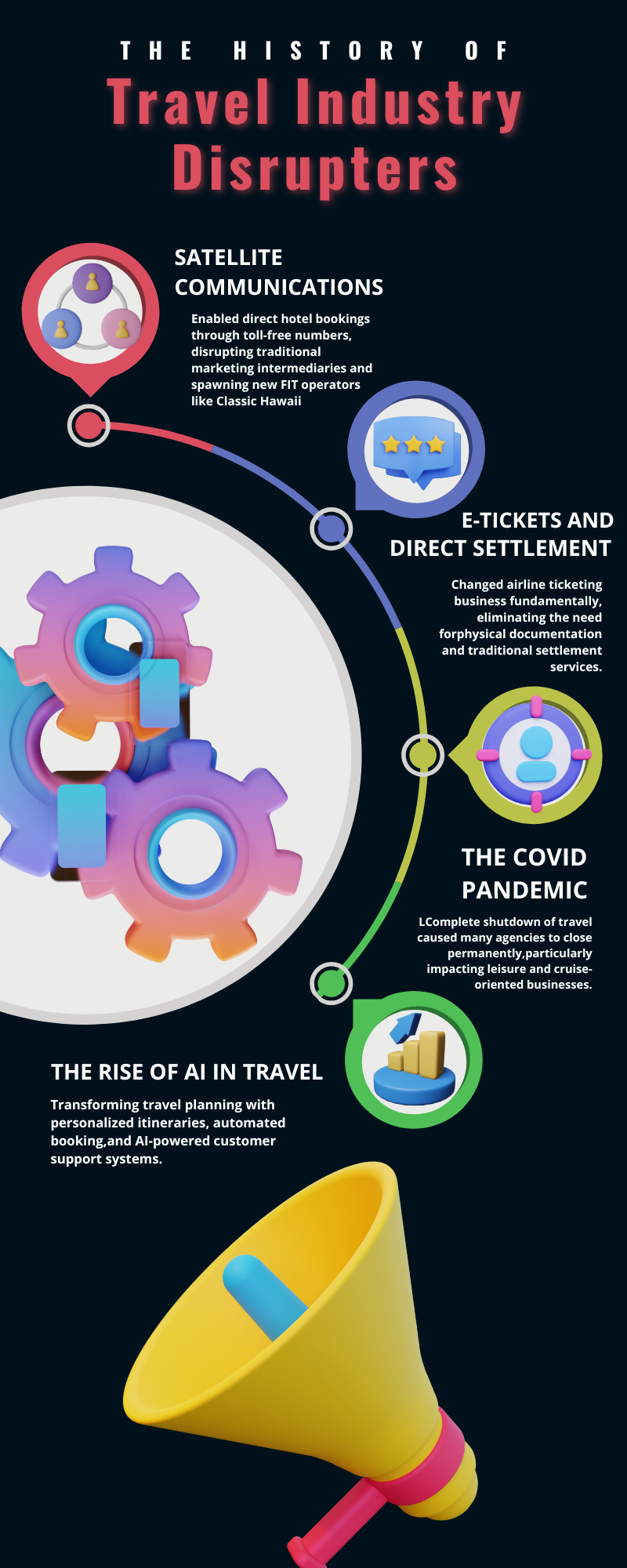From Satellite Communications to Artificial Intelligence
Written By: Tom Ogg, Co-Founder and Co-Owner – Travel Professional NEWS
The History of Travel Industry Disrupters
During my almost 60 years in the travel industry, there have been several events that changed the travel industry in ways where some travel agents grew their business while other agencies closed their doors. AI is just another opportunity in disguise of a disrupter. Following are some of the major disrupters that have happened in the travel industry over the last 50 years.

Satellite Communications: When satellite communications enabled hotels in Hawaii to get toll-free reservation numbers it devastated companies like Hawaii Hotel Marketing over night. It also spawned Hawaii FIT operators like Classic Hawaii, Runaway Tours and so on.
Satellite Communications When the CRS was made available to agencies it enabled those that were able to acquire them to succeed. Agencies that were still handwriting airline tickets failed over time. The availability of personal computers allowed some agencies to automate much of their operation and gain efficiencies.
E-tickets and Direct Settlement: E-ticketing and direct settlement changed the very nature of the airline ticketing business. In essence the travel agency business provided documentation and settlement services for the airlines. When e-tickets and direct settlement eliminated the need for the services to be provided by independent travel agencies evaporated.
Elimination of Airline Commissions: As e-ticketing and direct settlement evolved, airline commissions were reduced and then completely eliminated. This caused many retail storefront travel agencies to go out of business. It also founded the evolution of home-based travel agencies. It was truly an incredible time
The Covid Pandemic: The complete shut down of travel caused many travel agencies to close their doors for good. The shut down of the cruise industry hit leisure oriented travel agencies extremely hard closing many of them
The Rise of AI in Travel: Artificial intelligence (AI) is poised to have a transformative impact on the travel industry in the coming years. As AI technology continues to advance, we’re likely to see a range of innovative applications that reshape how travelers plan, book, and experience their trips. This evolution will inevitably affect the role and day-to-day work of travel agents. But, like all the of the disrupters before AI, those agents that see the opportunities and pursue them, will not only survive, they thrive. Those that don’t, may not survive. Following are ways that AI may impact the travel industry.

Personalized Trip Planning
One of the key ways AI will change travel is through more intelligent and personalized trip planning. AI-powered travel apps and assistants will be able to analyze an individual user’s preferences, past trips, and real-time data to automatically generate highly customized itineraries. These systems will take into account factors like budget, interests, travel dates, and even the weather forecast to provide seamless, optimized travel plans.
For travel agents, this means a shift away from the traditional model of manually researching and assembling travel packages. Instead, they’ll need to focus more on understanding their clients’ needs and translating those into the right AI-generated recommendations. Travel agents who can effectively leverage AI-driven planning tools to deliver hyper-personalized experiences will be well-positioned to thrive.
Automated Booking and Support
In parallel with AI-powered planning, we’ll also see travel booking become more automated. AI chatbots and virtual assistants will be able to handle a growing range of customer service tasks, from answering basic questions to completing flight and hotel reservations. This could significantly reduce the administrative burden on travel agents, allowing them to focus more on higher yield services.
However, this automation also poses a potential threat to traditional travel agents. Consumers may increasingly turn to self-service AI tools for their travel needs, cutting out the middleman. To remain competitive, agents will need to demonstrate the unique value they can provide beyond simple booking and support, such as specialized expertise, personalized guidance, and concierge-level services.

AI Generative Marketing Tools
If you have not started using AI generative apps, you should start right now. If you are not yet using ChatGPT go to chat.openai.com and sign up. It is free and as you use it, it will all start to make sense. There are apps that do just about everything you can imagine. As an example I made most of the images of our new “Selling River Cruises, For Travel Agents” book using Adobe Firefly and when you see the book you will not believe it. AI is overwhelming, but start by using ChatGPT.
AI-Generated Travel Apps
One intriguing possibility is the emergence of AI systems that can actually create custom travel apps and tools. Imagine an “AI app builder” that allows travel agents to input their specific niche or target audience, and then automatically generates a tailored mobile app or website for their clients. This could enable travel agents to quickly develop their own branded, AI-powered travel planning solutions without needing extensive technical skills.
Such AI-generated apps might include features like intelligent itinerary builders, real-time trip monitoring, language translation, and predictive recommendations. By equipping travel agents with these kinds of AI-driven capabilities, the technology could empower them to better serve their customers and carve out specialized market positions.

The Future of Travel Agents
Ultimately, the rise of AI in travel represents both challenges and opportunities for travel agents. While automation may disrupt certain traditional agent roles, those who adapt and harness the power of AI will be able to provide even greater value to their clients. The travel agents who thrive in the years ahead will be those who can seamlessly blend human expertise with intelligent technology offering personalized, AI-enhanced travel experiences that meet the evolving needs of modern consumers.

